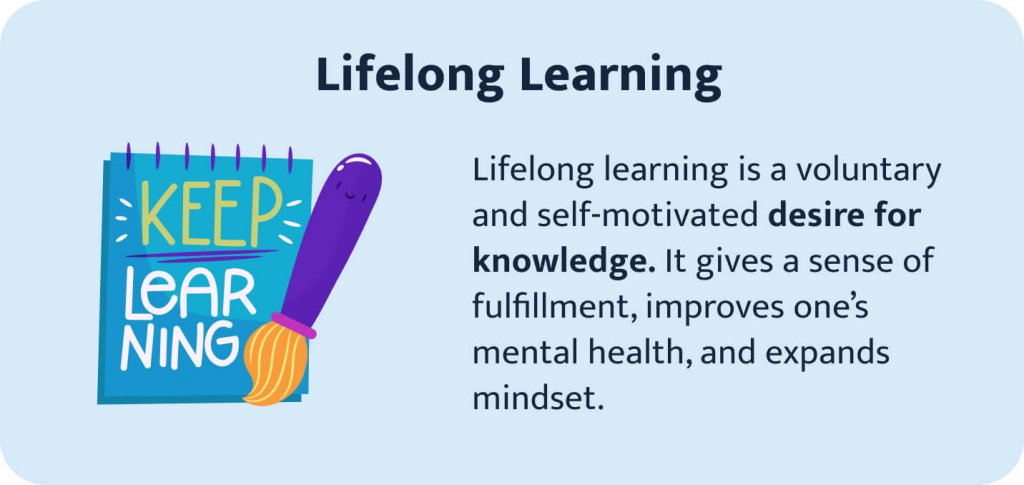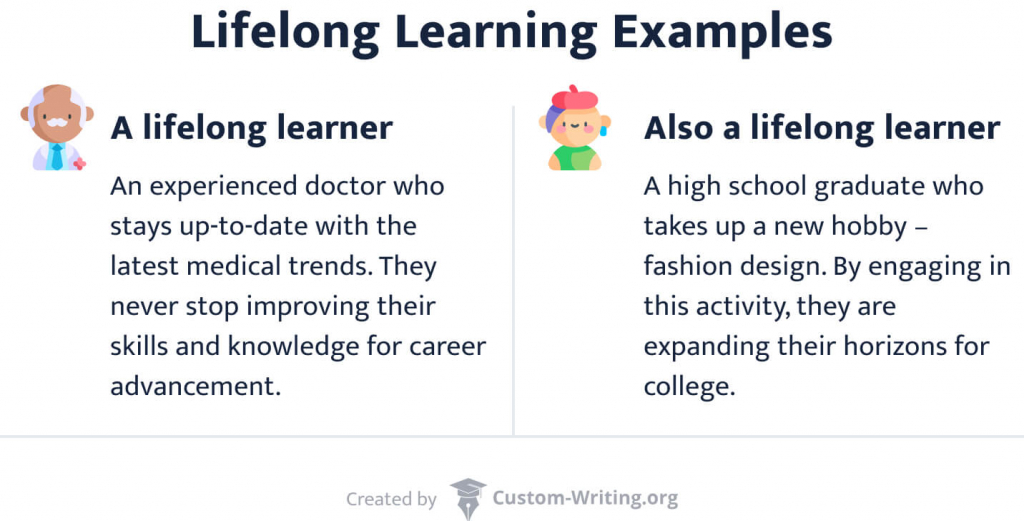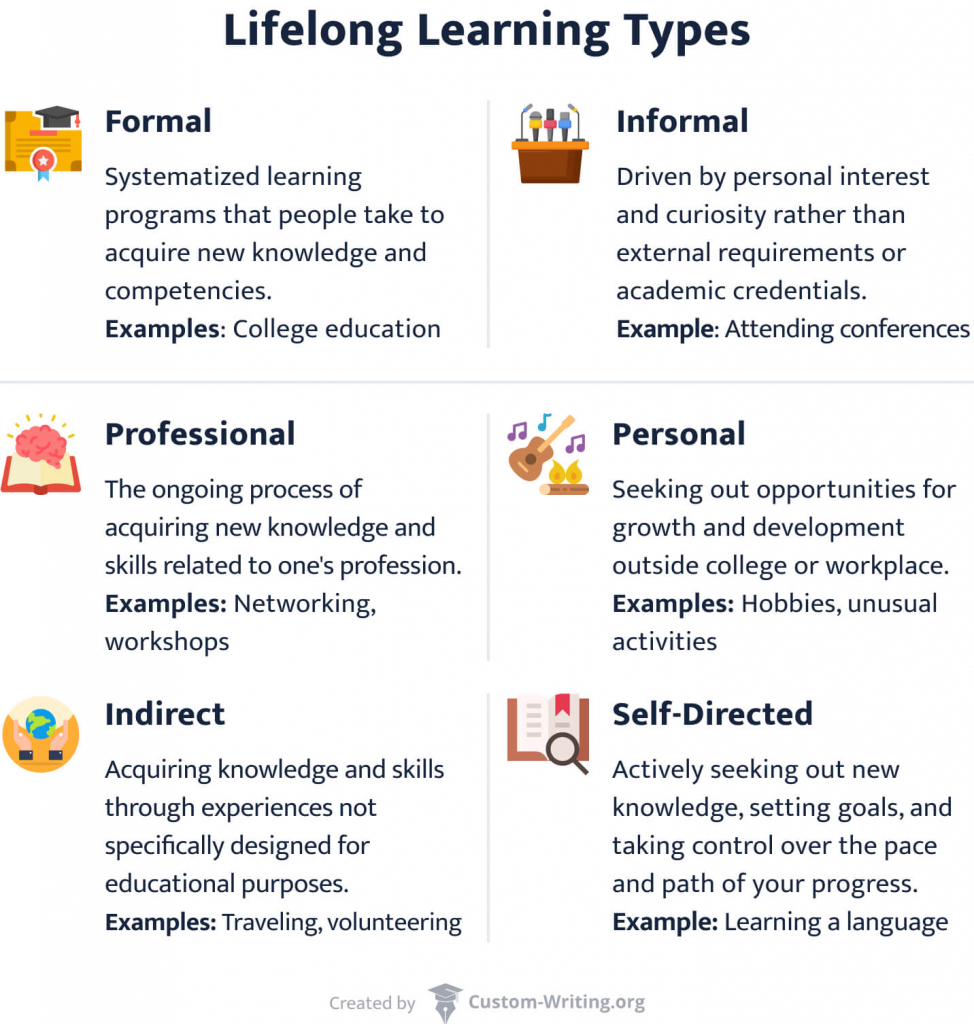Non scholae sed vitae discimus – We don’t learn for school, but for life
While for some people, lifelong learning is a buzzword from yet another New York Times bestseller, for others, it is a lifestyle. Learning throughout life means continuously seeking knowledge and expanding your horizons, regardless of your age or life circumstances. This mindset encourages you to never stop growing and discovering new things, whether that means learning to code or cook brownies.

With modern technology, lifelong learning is more accessible than ever before. We mean those online courses, webinars, and podcasts on all kinds of topics that push you to learn at your own pace, wherever you are. Let’s discover the joys of lifelong learning together! In this post, our custom essay writers will explore the benefits of lifelong learning and why it’s never too late to start.
🧑🏫 What Is Lifelong Learning?
Lifelong learning refers to the continuous process of receiving new knowledge and experiences. To some point, it represents a commitment to personal and professional growth. Lifelong learning comes in various modes, comprising formal and informal learning activities. Formal education requires attending college or university, taking online courses, or pursuing a certification in a particular field. Informal learning involves reading books, playing sports, or participating in online webinars.
Let’s consider two cases of lifelong learning:
- A professional doctor who attends conferences, workshops, and training to stay up-to-date with the latest medical trends. By doing so, they enhance their qualification and knowledge, stay competitive, and position themselves for career progress.
- A high school graduate during a gap year before college who takes up a new hobby, learning Korean, taking graphic design classes, or joining a book club. By engaging in these activities, they are extending their skills to figure out what they want to do later in college.

🤩 Benefits of Lifelong Learning
Numerous benefits of lifelong learning have been recorded. This section will present the advantages of lifelong learning for you as a person and for society as a whole.
For Individuals
- Improved academic and career opportunities. Studying through life allows people to acquire relevant knowledge and skills that can help them prosper in college and the workplace.
- Personal growth. People better understand themselves and their place in the world. Constant learning inspires personal expansion and betters self-awareness.
- Better health. Although unobvious, permanent self-development can improve cognitive function and maximize overall life quality. Recent research in neurology has even proven that educational activities can delay symptoms of Alzheimer’s.
- A creativity boost. Learning pushes people to examine fresh perspectives, which can promote creativity and innovation. This can be winning in both their personal and professional lives.
- Personal fulfillment. Lifelong learning can grant a sense of personal fulfillment as people pursue their passions. It can also assist in refining low self-esteem to feel more empowered.
For Society
- Social cohesion. When people with diverse backgrounds are brought together and engage in shared activities, they foster greater understanding and tolerance towards each other. Therefore, permanent learning can boost a sense of solidarity among people.
- Innovation. Continuous education stimulates innovation and creativity, leading to the formation of new technologies and services that benefit society as a whole.
- Environmental sustainability. Another essential aspect is the promotion of environmental sustainability, which lifelong learners successfully implement. They raise awareness of environmental issues and encourage individuals to take action to protect the environment.
- Economic growth. Constantly acquiring new information can contribute to developing a skilled and knowledgeable workforce, which drives economic prosperity.
- Equality. Lifelong learning can guarantee that all society members have access to education and training opportunities, whatever their background or circumstances are.
📚 Habits of a Lifelong Learner
The well-known principle “fake it till you make it” can also be helpful in terms of lifelong learning. If you don’t know where to start, check out this list of lifelong learner habits. You might want to incorporate them into your daily routine, and soon you’ll develop your own effective lifelong learning strategies.
Some bonus tips that can help you make learning a part of your daily routine:
- Install apps so that you can study anywhere and at any time. Check out Duolingo for language exercises or Brilliant to learn math or computer science.
- Surround yourself with other lifelong learners. Find someone you can ask for feedback on your progress and use their suggestions to improve.
- Try new things. You should try new things every day to help yourself step out of your comfort zone. Simple things like having an exotic meal for lunch can help you take on new challenges and grow.
- Make reading a habit. Lifelong learners read books, articles, and blogs on various topics to expand their knowledge and understanding. If you’re not a fan of reading, you can try podcasts or educational videos like TED talks.

🤹 Lifelong Learning in Action: 6 Types
There is no one proper way to be a lifelong learner. There are six main types, each serving its own mission.
Formal
Universities and colleges typically offer this type of learning as it refers to organized study programs that people take on to acquire new knowledge. Individuals who seek to enhance their career prospects or stay up-to-date with industry trends and developments usually pursue this model of self-improvement.
Some examples of formal learning are:
- Degree programs. Give you a bachelor’s or master’s degree.
- Continuing education courses. These courses are offered by universities and assist in updating your expertise in a particular field.
- Certificate programs. Provide specialized knowledge and skills in a narrow area.
Informal
Informal learning is often self-led and can take many forms, such as reading, attending conferences, participating in online forums, or engaging in hobbies. It is driven by personal interest and curiosity rather than external requirements or academic credentials.
Informal lifelong learning examples:
- Reading books or watching educational videos. If you choose content wisely, it can raise your competence in a specific field.
- Visiting conferences. Conferences let you learn from field experts and network with other professionals.
- Engaging in hobbies. Hobbies such as cooking, woodworking, or playing a musical instrument also contribute to your development.
Professional
Professional lifelong learning is the ongoing process of acquiring expertise related to one’s profession. It is essential for people to stay updated with recent trends and prominent achievements to remain competitive. Besides improving within one field, lifelong learning also occurs when a person decides to switch careers and try something new.
Consider these examples:
- Attending workshops. Meetups in your profession help you keep up with the latest breakthroughs.
- Participating in an online course or certification program. Narrowly focused classes grant you new skills and knowledge relevant to your career.
- Networking. Interacting with other professionals in the industry guarantees to receive new experiences and ideas and to learn from each other.
Self-Directed
Self-directed lifelong learning expects you to take responsibility for your own development. It means actively setting goals, seeking out new sources of knowledge, and controlling the pace and path of your progress. Self-directed learners are driven by an aspiration to become the best version of themselves rather than external rewards or pressures.
Examples of self-directed lifelong learning:
- Learning a new language. To learn a new language, choose resources and language programs.
- Developing a new hobby. Research various techniques and materials and then practice regularly.
- Continuing education. Pursue continuing education opportunities such as online courses or workshops to stay up-to-date in the field or develop new skills.
Indirect
Indirect lifelong learning encompasses acquiring experience and knowledge through activities not specifically designed for educational goals. It can be learning via observation, reflection, and participation in everyday life.
Here are some examples of it:
- Traveling. This activity is indirect because it is not structured but rather results from experiencing new environments and communicating with people of distinct backgrounds.
- Listening to podcasts. Podcasts not only supply new information but also improve critical thinking skills and empathy by exposing listeners to opposing perspectives.
- Volunteering. Participating in community service projects may teach you about social issues, provide opportunities for teamwork, and strengthen leadership skills.
Personal
Personal lifelong learners seek out opportunities for growth and development outside their daily habitat. Personal lifelong learning often involves exploring specific topics and engaging in unusual hobbies along with other activities.
Personal lifelong learning means:
- Expanding your personal network. Understand the value of establishing relationships with those who share your interests or can offer different perspectives.
- Self-reflection. Recognize the importance of self-reflection in the learning process and life in general. Identify the areas to improve by meditating, breathing exercises, or journaling.
- Becoming a standup comedian. Standup comedy or any other specific hobby that takes time and effort is another example of lifelong personal learning. Such an unusual hobby helps connect with any audience and boosts self-esteem.

🤯 The Mindset of a Lifelong Learner
Here’s a small guide if you’re wondering how to develop a lifelong learner mindset.
Step #1 Recognize what traits of a lifelong learner you already have. Since lifelong learning is about what’s inside you, focusing on your strengths is essential. Think about traits like curiosity, open-mindedness, or self-reflection that you already have and can use during your learning journey.
Step #2 Become comfortable with stepping out of your comfort zone. Fear and discomfort often hold us back. To develop a lifelong learning mindset, embrace challenges, and be open to failure. Consider mistakes as opportunities to learn and grow.
Step #3 Make use of both formal and informal learning opportunities. Don’t expect college to be the only source for personal development. Always try to understand more than you’re given in lectures and supplement your knowledge with related books, YouTube videos, or hands-on experience.
Step #4 Expand your community. Good company always helps. Connect with other lifelong learners to expand your mindset and stay motivated. Join a book club or a class, attend seminars and workshops, or engage in online discussions to connect with like-minded people.
Step #5 Enroll in a lifelong learning institute. Lifelong learning colleges and universities can provide the necessary educational frameworks. Programs like Professional and Lifelong Learning at Harvard use peer-led and instructor-led meetings to offer continuing education to their students. They also feature outside assignments to ensure all learners can expand beyond a surface-level understanding.
💡 Examples of People Who Never Stopped Learning
For your inspiration, we’ve collected the personal stories of several famous lifelong learners. These achievers prove you can succeed at any age with hard work, determination, and a growth mindset.
👩🍳 Julia Child
Before becoming a celebrated chef and cookbook author, Julia Child was a research assistant for the U.S. government. At the age of 50, she began training at Le Cordon Bleu cooking school. She then revolutionized how Americans perceived French cuisine with her cookbooks and television shows.
🦸 Samuel L. Jackson
Samuel L. Jackson worked as a struggling actor for over twenty years before landing his breakthrough role in the film “Pulp Fiction” at 46. Since then, he has been proclaimed one of Hollywood’s most recognizable and hardworking actors.
👩🎨 Vera Wang
Vera Wang started her career as a figure skater before switching to the fashion world. Despite facing criticism early on, Wang persevered, and at the age of 40, she launched her own bridal gown design business. As of today, she is one of the world’s most successful and influential fashion designers.
🧑💼 Colonel Sanders
Colonel Sanders worked as a farmer, a gas station attendant, and even a railroad fireman before founding Kentucky Fried Chicken at 62. He controlled the company’s marketing procedures and built one of the most successful fast-food chains in the world.
In today’s uncertain reality, lifelong learning is not a choice but rather a necessity. Imagine having the expertise and confidence to rise to any complexity that comes your way! That’s what lifelong learning can give you. It’s not just about earning good grades or becoming an employee of the month but instead about fostering a mindset of growth, curiosity, and exploration.
Simply put, the more you study and try, the more experience you obtain. Continuous learning improves critical thinking and problem-solving skills and can equip you with the necessary tools to adapt to ever-changing circumstances. Moreover, lifelong learning boosts confidence and self-esteem, increases social opportunities, and improves health and overall well-being. Embrace lifelong learning, and let it guide you as you explore the world and the opportunities it provides. The possibilities are endless, and the journey is yours to take.
🔗 References
- 4 reasons to become a lifelong learner for the New Year | University of Cincinnati
- 10 Reasons Why Lifelong Learning is the Only Option
- 7 daily habits of successful lifelong learners | EAB
- 10 helpful habits to develop a lifelong learning mindset | Tips and activities | University of Phoenix
- Lifelong Learning Explained: 4 Benefits of Lifelong Learning – 2024 – MasterClass
- 30 People Who Became Highly Successful Later in Life


![How to Organize a Successful Study Group [GUIDE]](https://custom-writing.org/blog/wp-content/uploads/2023/04/doing-homework-together-1-284x153.jpg)

![The Scaffolding Technique in Education: Benefits & Examples [Is It Really Useful?]](https://custom-writing.org/blog/wp-content/uploads/2023/03/business-women-signature-document-1-284x153.jpg)






